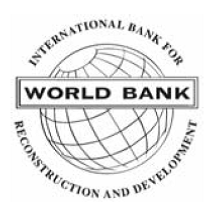WASHINGTON, December 18, 2018—The World Bank (International Bank for Reconstruction and Development, IBRD, Aaa/AAA) has made the third repayment of bonds issued under an innovative pilot program that uses auctions and price guarantees, delivered in the form of bonds, to promote private sector investment in climate action. The program, known as the Pilot Auction Facility (PAF), was launched in 2015 as an innovative way to use capital market instruments to create incentives for companies to reduce greenhouse gas emissions.
The value of bonds repaid—US$ 11.5 million—is linked to the performance of private sector projects that reduce greenhouse gas emissions. Bond holders have the option to redeem bonds in exchange for carbon credits they receive by reducing greenhouse gas emissions. The payment value reflects the equivalent of 4.4 million metric tons of reduced carbon dioxide emissions.
When businesses reduce greenhouse gas emissions from the atmosphere, they receive credits which they can sell. But due to falling prices of carbon credits, businesses have fewer incentives to invest in climate-friendly projects. Supported by donor funding, the PAF creates incentives for continued investments in projects that combat climate change by guaranteeing a minimum price on carbon credits.
The price guarantees are delivered in the form of specialized bonds issued by the World Bank (IBRD). The bonds pay zero interest and redeem annually, providing a redemption amount for each set of eligible carbon credits delivered. Under the PAF, the World Bank has issued US$54 million in these bonds.
The most recent bond redemption was on November 29, 2018. The carbon credits came from projects such as landfill gas-to-energy projects in Brazil, Chile, India, Malaysia, Mexico and Thailand; wastewater treatment and biogas utilization projects in Thailand; and two nitrous oxide abatement projects in Chile and Egypt.
The bonds will continue redeeming until 2020. Over 60 firms from around the world bid for the bonds through auctions, with 24 firms winning price guarantees. Companies compete by bidding the least amount of incentive they need to run their operations in a climate-friendly way. In this way, the auctions determine the price guarantees, and PAF rewards only the most efficient companies.
Because the price guarantee is delivered in the form of a bond, bond holders have flexibility in how they redeem the guarantees: should they have less credits to redeem than allowed by the bond, they can sell the bonds to other firms, incentivizing continued climate action.
Building on the pilot phase, the World Bank is expanding into a broader Climate Auctions Program, that includes the Nitric Acid Climate Auction Program. The World Bank is also exploring how to use auctions to help support energy-efficiency housing development and encourage countries to implement their goals under the Paris Climate Agreement.
“” said Alexis Leroy, CEO of Allcot, a sustainability firm that helps projects generating emission reductions eligible for PAF funding. “The renewable electricity generated from the landfill helps power the local area, prevents harmful gas from being released into the atmosphere and facilitates the country’s fulfillment of its sustainable development goals.”
“ Yet there are trillions of dollars of opportunities for the private sector to invest in projects that will help save the planet,” said John Gandolfo, World Bank Acting Treasurer. “The World Bank will continue to focus on developing capital market innovations such as the PAF to connect investment flows with projects that address climate change.”
"," said John Roome, World Bank Senior Director for Climate Change. "The World Bank is ready to engage with governments to explore how a tool like Climate Auctions can help them achieve and even further their ambition under the Paris Agreement."
The World Bank pioneered the use of capital market instruments to unlock financing for climate action. It issued the first green bond in 2008, catalyzing the growth of the market and providing a new way for bond investors to support projects that address climate change around the world. Since then, the World Bank has raised close to US$13 billion in green bonds in a range of currencies and markets around the world.
The World Bank Group recently announced a major new set of climate targets for 2021-2025, doubling its current 5-year investments to around US$200 billion in support for countries to take ambitious climate action. The new plan significantly boosts support for adaptation and resilience, recognizing mounting climate change impacts on lives and livelihoods, especially in the world’s poorest countries. A key priority is boosting support for climate adaptation, recognizing that millions of people across the world are already facing the severe consequences of more extreme weather events. By ramping up direct adaptation finance to reach around US$50 billion over FY21-25, the World Bank will, for the first time, give this equal emphasis alongside investments that reduce emissions.
About the World Bank
The World Bank (International Bank for Reconstruction and Development, IBRD), rated Aaa/AAA (Standard & Poor’s/Moody’s as of July 2018), is an international organization created in 1944 and the original member of the World Bank Group. It operates as a global development cooperative owned by 189 nations. It provides its members with financing, expertise and coordination services so they can achieve equitable and sustainable economic growth in their national economies and find effective solutions to pressing regional and global economic and environmental problems. The World Bank has two main goals: to end extreme poverty and promote shared prosperity. It seeks to achieve them primarily by providing loans, risk management products, and expertise on development-related disciplines to its borrowing member government clients in middle-income countries and other creditworthy countries, and by coordinating responses to regional and global challenges. It has been issuing sustainable development bonds in the international capital markets for 70 years to fund its activities that achieve a positive impact.
Information on World Bank bonds for investors is available on the World Bank Treasury website:
https://treasury.worldbank.org/en/about/unit/treasury/ibrd.
For more information about World Bank Sustainable Development Bonds, see:
https://treasury.worldbank.org/en/about/unit/treasury/ibrd/ibrd-sustainable-development-bonds.

